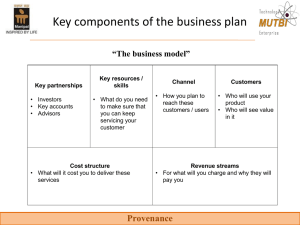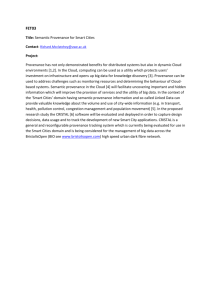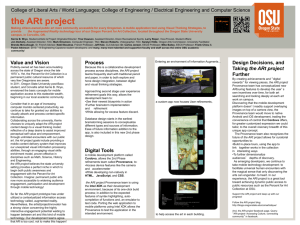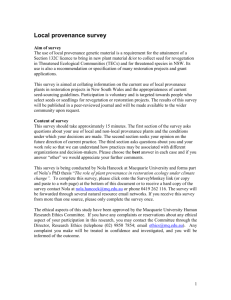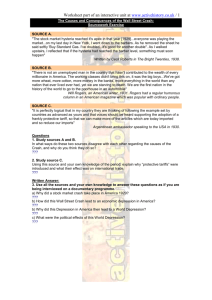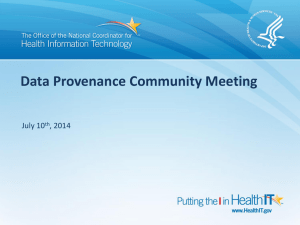7-17 All Hands
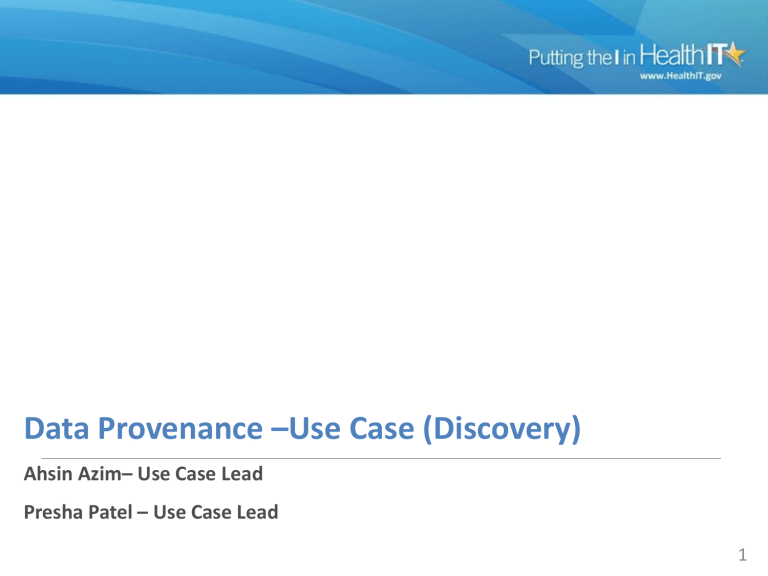
Data Provenance –Use Case (Discovery)
Ahsin Azim– Use Case Lead
Presha Patel – Use Case Lead
1
1
2
3
4
5
6
7
8
9
10
11
12
Proposed Use Case & Functional
Requirements Development Timeline
Week
Target Date
(2014)
6/12
6/19
6/26
7/3
7/10
7/17
7/24
7/31
8/7
8/14
8/21
8/28
All Hands WG Meeting Tasks
Use Case Kick-Off & UC Process Overview
Introduce: In/Out of Scope & Assumptions
Review: In/Out of Scope & Assumptions
Introduce: Context Diagram & User Stories
Review: Context Diagram & User Stories
Review: Finalize User Stories
Introduce: Pre/Post Conditions
Review: Finalize User Stories
Introduce: Pre/Post Conditions
Review: Pre/Post Conditions
Introduce: Actors & Roles, and Activity Diagram/Base Flow
Review: Actors & Roles, and Activity Diagram/Base Flow
Introduce: Functional Requirements & Sequence Diagram
Data Requirements
Review: Functional Requirements , Sequence Diagram and
Data Requirements
Introduce: Risks & Issues
Review: Risks and Issues
Begin End-to-End Review
End-to-End Comments Review & disposition
Finalize End-to-End Review Comments & Begin Consensus
Consensus Vote*
Review & Comments from Community via Wiki page due following Tuesday by 8 P.M. Eastern
Review: In/Out of Scope & Assumptions
Review: Context Diagram & User Stories
Review: Continue Review of User Stories
Review: Pre/Post Conditions
Review: Pre/Post Conditions
Review: Actors & Roles and Activity Diagram/Base Flow
Review: Functional Requirements & Sequence Diagram, and
Data Requirements
Review: Risks & Issues
End-to-End Review by community
End-to-End Review ends
Begin casting consensus vote
Conclude consensus voting
2
Sections for Review
Today we will be reviewing:
1. Pre/Post Conditions
Introduce:
1. Actors & Roles
2. Activity Diagrams
3. Base Flows
Double click the icon to open up the Word
Document with the sections for review
3
Pre/Post Conditions
Preconditions
• Where it exists, the assembling software, is integrated into systems such as EHRs, PHRs, and HIEs – indicating the type of information for a receiver to use as provenance for calculating reliability, and the organization or person responsible for deploying it
• There exists an Access Control System that allow the assembler to perform necessary tasks for predecessor artifacts and newly assembled artifacts
• All systems generating or consuming any artifact are capable of persisting the security labels received and data segmentation based the security labels assigned by the artifact generator, which may be an assembler
Post Conditions
• Receiving system has incorporated provenance information into its system and association of the provenance information to the source data is persisted
• Sending and receiving systems have recorded the transactions in their security audit records
4
A look ahead: Data Provenance
Next Week
• July 24 th , 2014 – All Hands Community Meeting (2:30-3:30)
– Review Actors & Roles, Activity Diagrams and Base Flows
Provide your comments on the bottom of this page http://wiki.siframework.org/Data+Provenance+Use+Cases
5
Support Team and Questions
Please feel free to reach out to any member of the Data Provenance
Support Team:
• Initiative Coordinator: Johnathan Coleman: jc@securityrs.com
• OCPO Sponsor: Julie Chua: julie.chua@hhs.gov
• OST Sponsor: Mera Choi: mera.choi@hhs.gov
• Subject Matter Experts: Kathleen Conner: klc@securityrs.com
and Bob
Yencha: bobyencha@maine.rr.com
• Support Team:
– Project Management: Jamie Parker: jamie.parker@esacinc.com
– Use Case Development: Presha Patel: presha.patel@accenture.com
and Ahsin Azim: ahsin.azim@accenturefederal.com
– Harmonization: Rita Torkzadeh: rtorkzadeh@jbsinternational.com
– Standards Development Support: Amanda Nash: amanda.j.nash@accenturefederal.com
– Support: Lynette Elliott : lynette.elliott@esacinc.com
and Apurva
Dahria: apurva.dahria@esacinc.com
6
